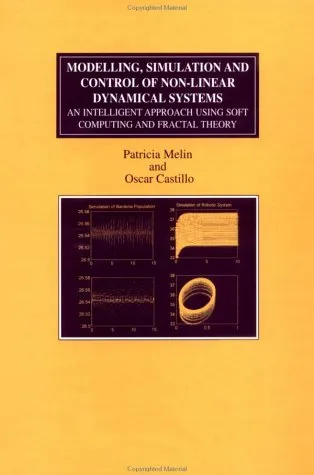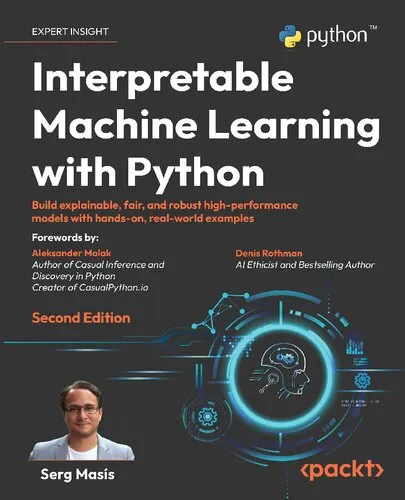Modelling, Simulation and Control of Non-linear Dynamical Systems: An Intelligent Approach Using Soft Computing and Fractal Theory (Numerical Insights)
4.5
Reviews from our users

You Can Ask your questions from this book's AI after Login
Each download or ask from book AI costs 2 points. To earn more free points, please visit the Points Guide Page and complete some valuable actions.Related Refrences:
Introduction to "Modelling, Simulation and Control of Non-linear Dynamical Systems"
Welcome to a comprehensive exploration of the fascinating world of non-linear dynamical systems and the intelligent techniques used to model, simulate, and control them. The book, "Modelling, Simulation and Control of Non-linear Dynamical Systems: An Intelligent Approach Using Soft Computing and Fractal Theory", offers an insightful and interdisciplinary perspective on addressing the complexities of non-linear systems with modern computational methodologies.
Non-linear dynamical systems are core to understanding a wide range of processes across science and engineering disciplines, yet their unpredictable and often chaotic nature presents significant challenges. By combining soft computing techniques, such as fuzzy logic, neural networks, and evolutionary algorithms, with fractal theory, Patricia Melin and Oscar Castillo provide readers with a robust framework for tackling these challenges. This book is designed for researchers, students, and practitioners seeking a balanced mix of theoretical foundations and practical approaches to solving real-world problems.
Detailed Summary of the Book
The book begins by providing a thorough introduction to non-linear dynamical systems, laying out their mathematical properties and inherent complexities. Unlike linear systems, non-linear systems showcase dynamic patterns such as bifurcations, chaos, and long-term unpredictability, making their modeling and control an intricate task.
Moving forward, the authors delve into the revolutionary role of soft computing methods in addressing these challenges. This includes an in-depth discussion on fuzzy logic systems, which are capable of handling uncertainty and partial truth, neural networks designed for learning and adaptability, and evolutionary algorithms inspired by natural selection mechanisms. These methods are presented not in isolation but as tools that can synergistically improve the accuracy and efficiency of non-linear system modeling and control.
One of the standout sections of the book is the incorporation of fractal theory. Fractals, known for their complex, self-similar structures, play a critical role in describing the seemingly chaotic behavior of non-linear systems. The book explores fractals as both a conceptual and computational tool, demonstrating how their geometry and scaling properties can be used to enhance simulation techniques.
Each chapter is enriched with detailed examples, illustrations, and algorithms applicable to diverse areas, including robotics, control systems, biological processes, and financial systems. The final chapters focus on state-of-the-art hybrid approaches that combine soft computing and fractal theory for optimized results, offering a glimpse into ongoing research and future possibilities in the field.
Famous Quotes from the Book
"The beauty of non-linear dynamical systems lies in their complexity; their chaos is not randomness but a higher order of organization waiting to be deciphered."
"Soft computing provides us the tools, while fractals provide us the vision, to model systems that defy traditional linear methodologies."
Why This Book Matters
This book is a trailblazer in bridging the gap between abstract theory and real-world applications. It introduces readers to concepts and methods that were once confined to advanced research labs and makes them accessible for solving practical problems in industry and academia.
Additionally, the interdisciplinary nature of this book resonates with the growing demand for integrative approaches in science and engineering. By combining tools from mathematics, computing, and physics, it prepares readers to handle increasingly complex systems with confidence and innovation. Whether you're an academic researcher delving into theoretical advancements or a practitioner aspiring to solve challenging problems, this book will expand your horizons and equip you with the necessary skills.
Free Direct Download
You Can Download this book after Login
Accessing books through legal platforms and public libraries not only supports the rights of authors and publishers but also contributes to the sustainability of reading culture. Before downloading, please take a moment to consider these options.
Find this book on other platforms:
WorldCat helps you find books in libraries worldwide.
See ratings, reviews, and discussions on Goodreads.
Find and buy rare or used books on AbeBooks.
1252
بازدید4.5
امتیاز0
نظر98%
رضایتReviews:
4.5
Based on 0 users review
Questions & Answers
Ask questions about this book or help others by answering
No questions yet. Be the first to ask!





![The Ultimate iOS Interview Playbook: Conquer Swift, frameworks, design patterns, and app architecture [Team-IRA]](https://s3.refhub.ir/images/thumb/The_Ultimate_iOS_Interview_Playbook__Conquer__29925.webp)







